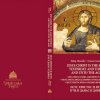Eve of the Feast Day of the Entry into the Temple of the Most Holy Theotokos
December 3, 2014, 9 p.m. Please join us!
Dear Brothers and Sisters,
In the Church of Christ the Savior in Arcadia, on December 3, 2014, the Eve of the Feast Day of the Entry into the Temple of the Most Holy Theotokos, there will be served an All-Night Vigil (Feast Day Vigil and Divine Liturgy) which will begin at 9 p.m.
His Grace, Bishop Grigorije of Zahumlje-Herzegovina, His Grace, Bishop Maxim of the Western American Diocese, Abbot of the Tvrdos Monastery Hieromonk Sava, and the clergy of the Los Angeles Deanery will be present at this prayerful gathering.
By this act our Diocese is renewing an old practice of serving an All-Night Vigil on the eve of a Feast Day with participation of all clergy, monastics, and the faithful from all neighboring parishes.
Our traditional chanting will contribute to the magnificence and grandeur of a night vigil.
We invite you all to attend this All-Night Vigil and, in that way, to symbolically participate in the Vigil of Sacred Serbian Royal Lavra of Hilandar where the monastics on this Feast Day will also have their Slava celebration.
.Свеноћно бденије у храму Христа Спаситеља у Аркадији
Навечерје Празника Ваведења Пресвете Богородице
3. децембар 2014, 21.00 ч.
Драга браћо и сестре,
У Храму Христа Спаситеља у Аркадији, у среду 3. децембра 2014. године, уочу празновања Ваведења Мајке Божије служиће се свеноћно бденије (Празнично бденије и Света Литургија) са почетком у 21.00 ч.
Молитвеном сабрању ће присуствовати Епископ Захумско-херцеговачки г. Григорије, Епископ Западноамерички г. Максим, Игуман Манастира Тврдоша јеромонах Сава и свештенство намесништва Лосанђелеског.
Овим чином наша Епархија обнавља праксу да се уочи сваког великог Празника служи свеноћно бденије уз учешће свештенства, монаштва и верникâ из свих оближњих парохија и манастира.
Наше традиционно појање учиниће ово молитвено сабрање још узвишенијим.
Позивамо вас да својим присуством на овом свеноћном бденију симболички учествујете у бденију наше Свештене Српске Царске Лавре Манастира Хиландара где монаштво тога дана прославља своју Крсну Славу.




